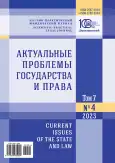Legal status of judicial institutions in the Kuban region in the post-reform period (1869–1920): based on the law enforcement practice materials
- Authors: PARSHINA N.V.1
-
Affiliations:
- Kuban State University
- Issue: Vol 7, No 4 (2023)
- Pages: 529-535
- Section: General Theory and History of Law and the State
- URL: https://journal-vniispk.ru/2587-9340/article/view/303693
- ID: 303693
Cite item
Abstract
On the basis of normative legal acts and archival materials, the features of the genesis of the judicial system in the Kuban region in the post-reform period are investigated. The socio-economic reasons explaining why the Judicial Statutes of 1864 were introduced in the region under consideration somewhat later than in the central provinces of the Russian Empire are revealed. With the help of historical-legal, comparative-legal, historical-archival and statistical methods of scientific cognition, the distinctive features of the formation of the post-reform judicial system in the Kuban region are identified. In particular, it is shown that, despite the all-religious principle of the work of judicial institutions, originally provided for in the relevant legislation of 1864, the features of class justice still continued to be preserved in the Kuban. The materials of judicial practice demonstrating the real specifics of criminal and civil proceedings in the Kuban region in the second half of the 19th century are analyzed. It is concluded that the current system of judicial system and judicial proceedings in the Kuban was a compilation of state and customary legal regulation. Along with the All-Russian legislation, it was based both on the religious norms of the mountain population and on Cossack customs, which were used in resolving civil disputes in the village courts.
About the authors
Natalia V. PARSHINA
Kuban State University
Author for correspondence.
Email: natalya.v.parshina2012@yandex.ru
ORCID iD: 0000-0003-4712-6340
PhD (Law), Associate Professor, Associate Professor of Theory and History of State and Law Department of the A.A. Khmyrov Faculty of Law
Russian Federation, 149 Stavropolskaya St., Krasnodar, 350040, Russian FederationReferences
- Isaev I.A. (2014). Judicial reform of 1864: purposes and contradictions. Istoriko-pravovye problemy: novyi rakurs = Historical-Legal Problems: the New Viewpoint, no. 9-2, pp. 39-43. (In Russ.) https://elibrary.ru/tbgzif
- Zhil’tsov S.V. (2019). Mirovoi sud po sudebnoi reforme 1864 goda [Magistrates’ Court for Judicial Reform 1864]. Moscow, Urlitinform Publ., 133 p. (In Russ.)
- Legkii D.M. (2011). Dmitrii Vasil’evich Stasov: sudebnaya reforma 1864 g. i formirovanie prisyazhnoi advokatury v Rossiiskoi imperii: k 150-letiyu sudebnoi reformy 1864 g. v Rossii [Dmitry Vasilyevich Stasov: Judicial Reform of 1864 and the Formation of the Sworn Legal Profession in the Russian Empire: to the 150th Anniversary of the Judicial Reform of 1864 In Russia]. St. Petersburg, 422 p. (In Russ.) https://elibrary.ru/pavcqw
- Demichev A.A. (2021). Principles of the civil procedural legislation of Russia in the second half of the 19th century. Aktual’nye problemy gosudarstva i prava = Current Issues of the State and Law, vol. 5, no. 18, pp. 214-225. (In Russ.) https://doi.org/10.20310/2587-9340-2021-5-18-214-225, https://elibrary.ru/dkyfhc
- Parshina N.V. (2023). K voprosu o provedenii sudebnoi reformy na territorii Kubanskogo kazach’ego voiska vo vtoroi polovine XIX v. [On the issue of carrying out judicial reform on the territory of the Kuban Cossack army in the second half of the 19th century]. Istoriko-pravovye problemy: novyi rakurs = Historical-Legal Problems: the New Viewpoint, no. 1, pp. 27-35. (In Russ.) https://doi.org/10.24412/2309-152-2023-1-27-35, https://elibrary.ru/zvfawa
- Shutilo O.V., Gracheva O.A. (2023). The concept of justice of the peace in the draft judicial statutes of 1864. Vestnik Saratovskoi gosudarstvennoi yuridicheskoi akademii = Saratov State Law Academy Bulletin, no. 2 (151), pp. 227-234. (In Russ.) https://doi.org/10.24412/2227-7315-2023-2-227-234, https://elibrary.ru/uxhsdp
- Gorbachev V.P. (2023). Criminal charge (criminal prosecution) as a function of the prosecutor’s office of the Russian Empire after the judicial reform of 1864. Lex Russica, no. 2 (195), pp. 101-112. (In Russ.) https://doi.org/10.17803/1729-5920.2023.195.2.101-112, https://elibrary.ru/gbxpfr
- Derevskova V.M. (2021). Problems of implementations of the judicial reform of 1864 and issues of the typology of the judicial system of the Russian Empire. Sibirskii yuridicheskii vestnik = Siberian Law Herald, no. 4 (95), pp. 20-32. (In Russ.) https://doi.org/10.26516/2071-8136.2021.4.20, https://elibrary.ru/sdrkdp
- Gondarenko A.S., Zozulya I.V. (2002). Sudebnaya sistema v Rossii: sravnitel’noe issledovanie razvitiya na rubezhakh XIX–XX i XX–XXI vekov: (Na primere Kubani i Stavropol’ya) [The Judicial System in Russia: a Comparative Study of Development at the Turn of the 19th–20th and 20th–21st Centuries: (on the Example of Kuban and Stavropol)]. Stavropol, Stavropol State University Publ., 314 p. (In Russ.)
- Vertepov T.A. (ed.). (1894). Terskii kalendar’ [Terek Calendar]. Vladikavkaz, Terek Regional Government Typography, 355 p. (In Russ.)
- Urushadze A.T. (2019). “Imaginary justice”: mountain verbal courts and the problem of judicial and administrative reform of the Caucasus region in the materials of the audit N.M. Reinke. Noveishaya istoriya Rossii = Modern History of Russia, no. 4, pp. 914-927. (In Russ.) https://doi.org/10.21638/11701/spbu24.2019.405, https://elibrary.ru/focqdt
- Makedonov L.V. (1906). Naselenie Kubanskoi oblasti po dannym vtorykh ekzemplyarov listov perepisi 1897 g. [Population of the Kuban Region According to the Second Copies of the 1897 Census Sheets]. Yekaterinodar, Kuban Regional Government Typography, 589 p. (In Russ.)
- Zakharova P.V. (2019). Modeli formirovaniya voennykh sudov v Rossii vo vtoroi polovine XIX – nachale XX veka [Models of the formation of military courts in Russia in the second half of the 19th – early 20th centuries]. Istoriko-pravovye problemy: Novyi rakurs = Historical-Legal Problems: The New Viewpoint, no. 2, pp. 40-55. (In Russ.) https://elibrary.ru/xddsyb
- Krakovskii K.P. (2017). Zemstvo heads and justice of the peace (reform of the local court, 1889). Istoriko-pravovye problemy: Novyi rakurs = Historical-Legal Problems: The New Viewpoint, no. 1, pp. 53-95. (In Russ.) https://elibrary.ru/yrjldz
Supplementary files








